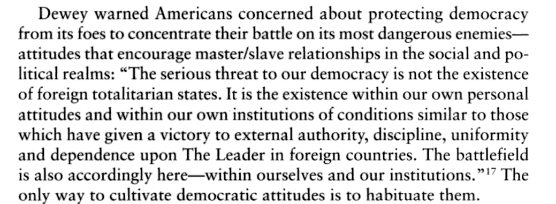I sometimes envy my fellow academics in the humanities who regularly renew their acquaintance with fundamental works that have slipped pretty deep into the well of my own memory because my job is to conduct and administer empirical research about current politics. For just that reason, I am thoroughly enjoying reencountering some major works as I teach first-year undergraduates this semester.
For instance, I now see Mill’s Utilitarianism in an entirely new way thanks to re-reading it with students after our extensive discussions of authors like Epicurus, Buddha, and Emerson. It seems much less an explanation of the utilitarian principle of justice (maximize everyone’s happiness) than I had remembered, and more an exploration of how an individual should pursue happiness. It thus belongs to a genre that Mill knew very well, the tradition of therapeutic philosophy inaugurated by the Hellenistic schools and revived by Montaigne.
In the text of Utiliarianism, Mill refers several times to Epicureanism and Stoicism. For instance: “I do not, indeed, consider the Epicureans to have been by any means faultless in drawing out their scheme of consequences from the utilitarian principle. To do this in any sufficient manner, many Stoic, as well as Christian elements require to be included.” This passage suggests that Mill is interested in constructing the kind of “eclectic” view (drawing from multiple Hellenistic schools) that was popular from the time of Cicero and continued in early Christianity.
Of course, one should expect as much based on the author’s Autobiography. In the chapter on the “Crisis in My Mental History,” Mill recalls how reading Jeremy Bentham in 1821 gave him “an object in life; to be a reformer of the world.” He would apply the classical utilitarian principle of justice to improve the general welfare. “My conception of my own happiness was entirely identified with this object.” He says he was open to experiencing his own pleasures–“I endeavoured to pick up as many flowers as I could by the way”–but the purpose of his life was to achieve social justice, defined in a utilitarian way.
“This did very well for several years, during which the general improvement going on in the world and the idea of myself as engaged with others in struggling to promote it, seemed enough to fill up an interesting and animated existence.” (Note that his personal satisfaction derived from two contingencies: political success and a supportive community.) But at one moment during the autumn of 1826, his satisfaction ended as suddenly as if he had awakened from a dream. He asked himself this question:
“Suppose that all your objects in life were realized; that all the changes in institutions and opinions which you are looking forward to, could be completely effected at this very instant: would this be a great joy and happiness to you?” And an irrepressible self-consciousness distinctly answered, “No!” At this my heart sank within me: the whole foundation on which my life was constructed fell down. All my happiness was to have been found in the continual pursuit of this end. The end had ceased to charm, and how could there ever again be any interest in the means? I seemed to have nothing left to live for.
Mill fell into a deep depression that ended only with his father’s death. A Freudian diagnosis is plausible (young John Stuart found momentary relief while his overbearing father still lived by reading a tragedy in which the fictional father died); but more interesting is Mill’s own explanation. He says that he recovered when he saw that happiness requires special strategies and techniques of mind. For instance, he came to believe that you can’t achieve happiness by pursuing it, only by aiming for some other end and becoming absorbed in that. He also learned that his own “passing susceptibilities needed to be cultivated as well as [his] active capacities, and required to be nourished and enriched as well as guided.” With that in mind, he paid more attention to poetry (especially Wordsworth) and music; “and the maintenance of a due balance among the faculties now seemed to be of primary importance.”
Above all, “I, for the first time, gave its proper place, among the prime necessities of human well-being, to the internal culture of the individual. I ceased to attach almost exclusive importance to the ordering of outward circumstances, and the training of the human being for speculation and for action.”
With that background in mind, it is striking how little his book Utilitarianism says about the “ordering of outward circumstances.” It doesn’t explain what policies would maximize aggregate happiness, how happiness relates to values like liberty and equality in a theory of social justice, or even how individuals should maximize their benefits to others. (No trolley problems at all.) Instead, Mill delves deeply into a theory of individual happiness.
For instance, he thinks that anyone who has achieved a higher grade of existence will prefer it to a lower grade, even though the higher grade permits “more acute suffering.” Evidently, we are not striving to avoid suffering, because then we would prefer a simpler or narrower mental life, less sensitive to pain. Something else must explain our preference for refined experiences, and Mill thinks the right word for that is “dignity.” (He notes that the Stoics called the same impulse “love of liberty,” implying that for them, “liberty” really meant pursuing higher interests rather than being free from constraints.) Thus, according to Mill, we seek at least two different things: happiness and dignity.
Mill is not very specific about what constitutes a higher grade of experience, and I think the text is compatible with two theories. First, it might be possible to make an objective rank-ordering of experiences, so that not only is poetry better than pushpin, but Wordsworth is better than Leigh Hunt because the former’s verse is superior. Alternatively, the quality of experience might mean the degree to which the individual happens to be stretched, engaged, inspired, etc. It would then be possible that playing an elaborate video game is a higher experience for a particular individual than hearing Beethoven, if the player engages more of his mind and soul in the game. We could objectively rank experiences by assessing the mental state of the participants rather than the activities themselves. Pushpin could beat poetry for champion pushpin-players.
In any case, Mill states that mental experiences are better than bodily experiences, and that active pleasures are higher than passive ones.
He also acknowledges that a person can abandon higher forms of experience due to indolence and selfishness. That scenario poses a challenge for him, because he has defended a distinction between higher and lower pleasures on the basis that anyone who has experienced both will prefer the higher. That argument preserves a thread between Mill’s position and classical utilitarianism (which is all about maximizing subjective preferences), but the thread would break if Mill favored higher pleasures even though some people renounce them voluntarily. He has an answer:
But I do not believe that those who undergo this very common change, voluntarily choose the lower description of pleasures in preference to the higher. I believe that before they devote themselves exclusively to the one, they have already become incapable of the other. Capacity for the nobler feelings is in most natures a very tender plant, easily killed, not only by hostile influences, but by mere want of sustenance; and in the majority of young persons it speedily dies away if the occupations to which their position in life has devoted them, and the society into which it has thrown them, are not favourable to keeping that higher capacity in exercise. Men lose their high aspirations as they lose their intellectual tastes, because they have not time or opportunity for indulging them; and they addict themselves to inferior pleasures, not because they deliberately prefer them, but because they are either the only ones to which they have access, or the only ones which they are any longer capable of enjoying. It may be questioned whether any one who has remained equally susceptible to both classes of pleasures, ever knowingly and calmly preferred the lower; though many, in all ages, have broken down in an ineffectual attempt to combine both.
Another key point is that sacrificing one’s own interests can be good for the individual because it gives her a valuable and absorbing objective. The classical utilitarian would regard sacrifice as a cost, required only if the benefit to others outweighs it. Mill continues to reject the view that “the sacrifice is itself [is] a good.” But sees that some forms of self-sacrifice may constitute happiness for the person who experiences them. In fact, “nothing except [an ability to sacrifice oneself for other] can raise a person above the chances of life … and enables him, like many a Stoic in the worst times of the Roman Empire, to cultivate in tranquillity the sources of satisfaction accessible to him, without concerning himself about the uncertainty of their duration, any more than about their inevitable end.” Mill observes that people who have privileges and yet remain unhappy tend to be those who don’t care for others. Contribution to a community is thus one path to happiness, as Mill himself had found in his early years. But another path is aesthetic experience, and Mill presumably advocates a balance of the two.
Mill also observes that a “continuity of highly pleasurable excitement” is impossible for us. A better objective is tranquility and acceptance, plus occasional excitement. “The happiness which [“the philosophers”] meant was not a life of rapture; but moments of such, in an existence made up of few and transitory pains, many and various pleasures, with a decided predominance of the active over the passive, and having as the foundation of the whole, not to expect more from life than it is capable of bestowing.”
See also: you have a right and a responsibility to attend to your own happiness; must you be good to be happy?; on philosophy as a way of life


